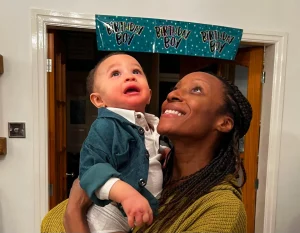Regaining Confidence After Breast Cancer
- Former Coronation Street star Victoria Ekanoye is looking back at her breast cancer journey, as she gets ready to celebrate the one year mark of her double mastectomy and reconstructive surgery.
- Ekanoye wasn’t sure if she’d ever feel sexy again, but luckily fellow actress Elizabeth Hurley and her son Nathan helped the actress get her mojo back with the help of Hurley’s swimwear line.
- Breast cancer surgery is a life-changing experience and many women face issues with body image after a mastectomy and/or reconstructive surgery.
- SurvivorNet has many resources for you when making the difficult decision on breast reconstructive surgery.
"It was a bikini from Elizabeth's range. They were like, 'This bikini will look amazing on you', so I tried it on,” Ekanoye told The Sun, in an interview.
Read MoreEkanyoe told The Sun: "Damian said, 'Get in front of that window', and then started taking all these photos of me.”

"He's incredibly talented. His eye captured something really special and I felt so proud when I looked at the photos he had taken,” she continued. "It was such a turning point for me psychologically."
Ekanoye’s Breast Cancer
The former star of British soap opera Coronation Street was diagnosed with breast cancer in 2021 after discovering a lump in her breast while breast feeding, according to The Sun.
"It makes you aware of your own mortality and with a young son, that was incredibly hard to think about,” said Ekanoye.

"I was more aware of breast cancer than most because I'd watched my mum, Candy, and my auntie Tracy go through it.”
Should I Get Genetic Testing Done?
The short answer is ‘yes,’ if you have a close relative who inherited an increased cancer risk you may want to consider testing. But there are some things you should know before you go.
"If somebody in your family is found to have a genetic predisposition to cancer, whether it be breast cancer or any other type of cancer, the first step is to start testing relatives most closely related to you,” says Rachel Webster, a genetic counselor at MD Anderson Cancer Center. "Those relatives might be brothers, sisters, parents children. Those first degree relatives are the ones that are at the highest probability of having that same genetic predisposition."
Webster also recommends meeting with a genetic counselor, because they will be able decide which type of genetic testing is best for you. And if you're worried about an invasive test, don't be.
"Genetic testing is probably the easiest test you have ever had in a cancer center. It is one tube of blood or a vial full of saliva," said Webster.
Webster explains that her job is to figure out what type of genetic testing may be most useful for the person she is meeting with and their family members. However, genetic counselors are not always easy to find.
For those who do not have access to a medical center or hospital that offers genetic counseling services, tele-health counseling may be available. If you're considering meeting with a genetic counselor and are unsure where to find one, the National Society of Genetic Counselors has resources on its website for locating a counselor.
Breast Reconstruction Options
If you've had a mastectomy, breast reconstruction is one of the major issues to consider. There are several options available. The reconstruction process can happen at the time of the surgery to remove the breast, or later on in the case of implants. Some women opt for no reconstruction initially, but decide later on that they want reconstruction to restore a sense of self, or simply get back to they way they used to look, says Dr. Andrea Pusic, the chief of Plastic and Reconstructive Surgery at Brigham Health, in a previous SurvivorNet interview.
Breast Reconstruction: Implants vs. Your Own Tissue
“It's an intensely personal choice, and the surgery options do give a very real and natural look of breasts,” she said. “The first option of using your own tissue is performed at the same time as the mastectomy. This involves taking tissue from your lower abdomen and implanting it into the chest. New connections for blood flow are devised and the end result is quite natural. The lower abdomen will have a scar from hip to hip, it's much like a tummy tuck only the fat removed has now been formed into a mound to create the new breast. This is a long (eight hour) surgery, and the hospital stay is three to five days. You will leave the hospital with drains and will need at-home care until the drains are removed. If you are having radiation, this surgery is probably not available as the skin has to be in good condition. It would be done after you have healed.”
“The second option is breast implants. This too can be done at the time of the breast surgery or completed later on. It involves implanting an expander that will be filled over several months with fluid, which will expand the chest tissue. Once the correct size is attained, a final implant of either saline or silicone is implanted,” said Dr. Pusic.
Body Positivity After Cancer
Struggling with body image after treatment for cancer is not unusual.
Having surgery that leaves a scar might be a necessary course of action. But it's important to remember that many of the physical changes caused by cancer treatment are only temporary even scars fade over time.
Marisa Gholson, a physician assistant at Compass Oncology at the Vancouver Cancer Center in Vancouver, Wa., tells SurvivorNet that many women even begin to embrace their scars after treatment.
Marisa Gholson, a physician assistant, discusses body image after cancer treatment.
"Some ladies will call them a badge of honor, that they have gone through that surgery," Gholson says. She also noted, however, that scars like many of the other side effects that come with ovarian or cervical cancer treatment will become significantly less prominent over time.
Treatment for ovarian or cervical cancer can also include the removal of a woman's reproductive organs like in Dunham's case which can also affect body image. When it comes to managing these side effects, keeping your emotional health in check whether that means seeing a therapist, visiting support groups or simply learning to accept your situation becomes a crucial part of the cancer journey.
Contributor: SurvivorNet staff
Learn more about SurvivorNet's rigorous medical review process.


